

Welcome to postnormal times ziauddinsardar. Biden Should Go Big, and Then Brag About It. But overall, this year’s ballot votes aren’t an anomaly.
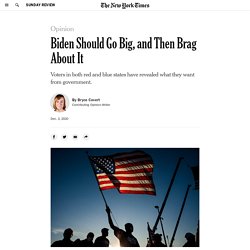
These are all consistently popular policies. A higher minimum wage has enjoyed nearly a quarter-century of going undefeated at the ballot box. Even a near doubling of the federal minimum garners strong support: two-thirds of Americans, including a majority of moderate Republicans, back a $15 minimum wage. Paid family leave is apparently a no-brainer, as more than 80 percent of voters support it, including strong majorities of Republicans. Health care - How covid-19 unleashed the NHS. ACCORDING TO SHELAGH O’RIORDAN, a consultant in geriatric medicine, patients often experience the National Health Service (NHS) as a conveyor belt.
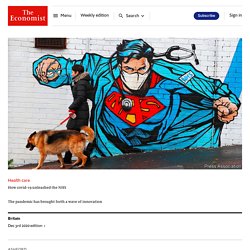
“You feel ill, you call this number. 'The way we get through this is together': the rise of mutual aid under coronavirus. People behaving badly is a staple of the news, and the pandemic has given us plenty of lurid snapshots.
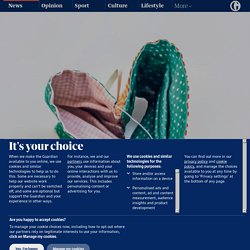
How America Helped Stop the Coronavirus in Asia. I don’t know about you, but I need a feel-good story right now.
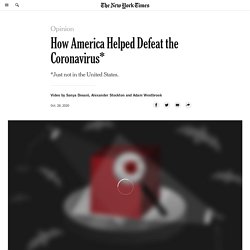
In the midst of America’s botched pandemic response, I’ve been searching for something to feel proud of. And in these caves, I found a great American success story, a story of leadership, foresight and ingenuity. ‘Freedom-loving Brits’? It's not that simple, Prime Minister. Why, if Britain is the great nation Boris Johnson says it is at every opportunity, has it handled the coronavirus pandemic so much worse than countries such as Germany and Italy?
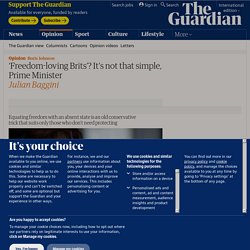
Like a job interviewee who “confesses” to be being “a bit of a perfectionist”, the prime minister’s answer to this question is a boast in thin disguise. “There is an important difference between our country and many other countries around the world,” Johnson told the House of Commons yesterday. “Our country is a freedom-loving country.” Johnson portrayed this as a primal impulse that resides deep in the national psyche, saying he was “deeply, spiritually reluctant to make any of these impositions, or infringe anyone’s freedom”. When it comes to liberty, if nothing else, the UK is world-beating. Covid-19 has exposed the reality of Britain: poverty, insecurity and inequality. After the catastrophe of the past eight months, a new political consensus seems to be emerging.
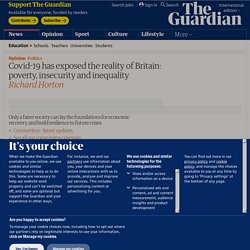
The government has to get a tighter grip of the country and the crisis we are facing. Taking back control now means that Boris Johnson must change his management style. Instead of remaining an aloof chairman of his government, he must become its hands-on chief executive. People didn't follow the Covid rules out of fear. They did it for the common good. As the government lurches from U-turns to full-on pile-ups, and a second wave of Covid-19 looms large, it’s worth remembering something.
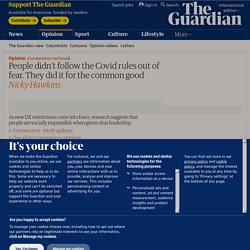
Foresight In The Time Of Covid-19: Prediction And Uncertainty - Long Finance. This article is written in March 2020 and discusses the role of foresight in exploring some of the impacts – beyond the economic – of the current Covid-19 pandemic.
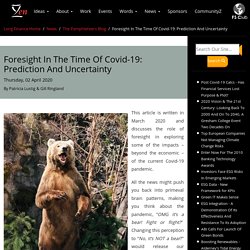
All the news might push you back into primeval brain patterns, making you think about the pandemic, “OMG it’s a bear! Fight or flight?” Changing this perception to “No, it’s NOT a bear?” Would release our energy and imagination. America’s Coronavirus Reopening Choice: Schools, Bars or Disney World? But we aren’t very good at discussing trade-offs.
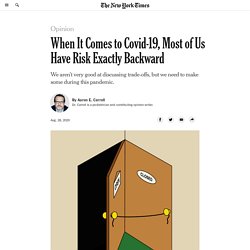
We want it all. Will Cars Rule the Roads in Post-Pandemic New York? Even before the pandemic, congestion already exacted a huge financial toll, costing the New York region an estimated $20 billion a year in lost worker productivity and higher fuel and operating expenses, according to the Partnership for New York City, a leading business group.
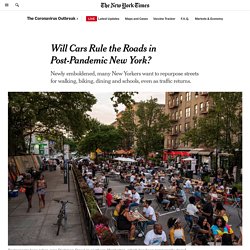
If transit riders stay away in significant numbers, that would also erode fare revenue from a public transit system facing its worst financial crisis in decades. At the same time, New York’s ambitious plan to cut down on traffic by imposing a fee on cars and trucks entering the busiest parts of Manhattan has stalled. That congestion pricing plan, which was expected to start early next year and raise money for public transit, has been delayed for at least a year by a federal review. “We’ve been talking about traffic and congestion for years and we haven’t done enough about it,” said Carlo A. COVID-19 Won’t Change Us Forever. Read: We’re living in the retro-future Let’s give ourselves some credit.
No matter how horrific the disaster, no matter how damaged our psyches, we wounded humans always bounce back. We rebuilt San Francisco after the 1906 earthquake. The United Nations. Not for Profit Resource. Steven Moe and Craig Fisher are leading members of the NFP Community in NZ. They have collaborated on a thoughtful and insightful paper that “looks at challenges faced by the Covid-19 crisis, poses 7 hard questions we need to be asking and examines where the opportunities are.” From the Introduction: “Covid-19 is forcing us to ask some hard questions. Our focus in this paper is on charities, NGOs, NFPs and community sector organisations as it has accelerated conversations for them about sustainability. However, many of these concepts will apply to other organisations as well in this unique moment in time.
Early explorers like those described in the quote who sailed to new placed relied on charts, maps, stars. How Germany Contained the Coronavirus by Jens Spahn. Compared to many other countries, Germany has managed the COVID-19 crisis well, owing to its properly funded health system, technological edge, and decisive leadership. But beyond any unique feature of the German system is something that all countries can replicate: a strong commitment to building public trust. Is the Covid-19 crisis the catalyst for greening the world's airlines? “The political moment is now” to address the climate risks posed by the aviation industry, analysts, insiders and campaigners say, as governments across the world weigh up bailouts for airlines grounded by the coronavirus pandemic. Rescue packages need to come with green strings, such as reduced carbon footprints and frequent flyer levies, they warn, or the sector will return to the path that has made it the fastest rising source of climate-wrecking carbon emissions over the past decade.
Old passenger jets also need to be rapidly retired or cheap oil prices will encourage budget airlines to run services almost empty, which could push up emissions even if passenger numbers stay low, they say. As did banks after the 2008-9 financial crisis, many aviation companies are appealing for government support to escape from a problem they partly caused. Thousands of planes have been grounded for two months. We Want to Know the Future of the Coronavirus. Too Bad. The best prophet, Thomas Hobbes once wrote, is the best guesser.
A dose of humility would do us good in the present moment. It might also help reconcile us to the radical uncertainty in which we are always living. – barbaragrieve
That would seem to be the last word on our capacity to predict the future: We can’t. But it is a truth humans have never been able to accept. We're all keen to show we care, but we've shaped a society that doesn’t care at all. World leaders unite in call for a people’s vaccine against COVID-19. More than 140 world leaders, experts and elders have made an unprecedented call for guarantees that COVID-19 vaccines, diagnostics, tests and treatments will be provided free of charge to everyone, everywhere GENEVA, 14 MAY 2020—More than 140 world leaders and experts, including the President of South Africa and Chair of the African Union, Cyril Ramaphosa, the Prime Minister of Pakistan, Imran Khan, the President of the Republic of Senegal, Macky Sall and the President of the Republic of Ghana, Nana Addo Dankwa Akufo-Addo have signed an open letter calling on all governments to unite behind a people’s vaccine against COVID-19.
The call was made just days before health ministers meet virtually for the World Health Assembly on 18 May. 'Cleaner and greener': Covid-19 prompts world's cities to free public space of cars. Humans are not resources. Coronavirus shows why we must democratise work. £2 billion package to create new era for cycling and walking. Largest ever boost for cyclists and pedestrians emergency bike lanes and streets will help support transport network trials of rental e-scooters to be brought forward to increase green transport options government working with leading tech developers to reduce crowding on public transport Far more people will be cycling and walking thanks to plans to boost greener, active transport, launched today (9 May 2020) by Transport Secretary Grant Shapps .
Pop-up bike lanes with protected space for cycling, wider pavements, safer junctions, and cycle and bus-only corridors will be created in England within weeks as part of a £250 million emergency active travel fund - the first stage of a £2 billion investment, as part of the £5 billion in new funding announced for cycling and buses in February. Fast-tracked statutory guidance, published today and effective immediately, will tell councils to reallocate roadspace for significantly-increased numbers of cyclists and pedestrians.
The world after covid-19 - Margaret MacMillan on covid-19 as a turning point in history. A better world can emerge after coronavirus. Or a much worse one. The coronavirus crisis seems to be encouraging belief in radical change. An astonishing 71% of Europeans are now in favour of introducing a universal basic income, according to an opinion poll designed by my research team at Oxford university and published today. In Britain, the figure is 68%. Less encouraging, at least to anyone who believes in liberal democracy, is another startling finding in the survey: no less than 53% of young Europeans place more confidence in authoritarian states than in democracies to tackle the climate crisis. How the pandemic endorsed leftist politics. The solution to food insecurity is food sovereignty.
UK coronavirus response utterly hypocritical, says UN poverty expert. The United Nations’ poverty expert Philip Alston has attacked the UK government’s coronavirus response as “utterly hypocritical” after successive administrations implemented policies of austerity and public-sector cuts.
“The policies of many states reflect a social Darwinism philosophy that prioritises the economic interests of the wealthiest while doing little for those who are hard at work providing essential services or unable to support themselves,” Alston said, warning that the pandemic could push more than half a billion additional people into poverty globally. – barbaragrieve
Cuomo. There is no point talking to Trump. We need to talk past him. The world after covid-19 - Bill Gates on how to fight future pandemics. The Guardian view on Covid-19 and transport: walk to the future. What would and should a post-pandemic world look like? The world after covid-19 - By invitation: Mark Carney on how the economy must yield to human values. Welcome to postnormal times. One day and one dream in the life of a self-isolating New Yorker. The choices we make about coronavirus are way more complex than 'lives v the economy' Scenes from a pandemic: life in 23 countries, from TED Fellows.